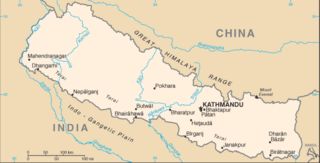
The United Nations Mission in Nepal or UNMIN was a special political mission in Nepal, established by the UN Security Council in January 2007 through resolution 174040 (2007) to assist in implementing key aspects of the Comprehensive Peace Agreement that ended the internal armed conflict in the South Asian country. The mandate was subsequently extended in resolutions 1796 (2008), 1825 (2008), 1864 (2009), 1879 (2009) and 1909 (2010). UNMIN ceased its operations on January 15, 2011.

United Nations Security Council Resolution 1864, adopted unanimously January 23, 2009, after recalling resolution 1740 (2007), 1796 (2008) and 1825 (2008) on the situation in Nepal, the Council extended the mandate of the United Nations Mission in Nepal (UNMIN), whose mandate expired that day, by another six months until July 23, 2009.

United Nations Security Council Resolution 1909, adopted unanimously on January 21, 2010, after recalling resolutions 1740 (2007), 1796 (2008), 1825 (2008), 1864 (2009) and 1879 (2008), the Council extended the mandate for the United Nations Mission in Nepal (UNMIN) until May 15, 2010 at the request of Nepal, deciding that it should also end on this date and further requiring UNMIN to hand over residual responsibilities including the monitoring of weapons and armed personnel.

United Nations Security Council resolution 793, adopted unanimously on 30 November 1992, after recalling resolutions 696 (1991), 747 (1992) and 785 (1992), and expressing its concern at the deteriorating political situation and the resumption of hostilities in Angola, the Council approved a recommendation by the Secretary-General Boutros Boutros-Ghali to extend the mandate of the United Nations Angola Verification Mission II for a further two months until 31 January 1993.

United Nations Security Council resolution 834, adopted unanimously on 1 June 1993, after reaffirming resolutions 696 (1991), 747 (1992), 785 (1992), 793 (1992), 804 (1993), 811 (1993) and 823 (1993), the council indicated its concern at the deteriorating political, military and humanitarian situation in Angola and extended the mandate of the United Nations Angola Verification Mission II for a period of 45 days ending 15 July 1993.

United Nations Security Council Resolution 1919, adopted unanimously on April 29, 2010, after recalling resolutions 1674 (2006), 1894 (2009) on the protection of civilians in armed conflict, 1612 (2005) and 1882 (2009) on children in armed conflict, 1502 (2003) on the protection of humanitarian and United Nations personnel, and 1325 (2000), 1820 (2008), 1888 (2009), and 1889 (2009) on women, peace, and security, the Council extended the mandate of the United Nations Mission in Sudan (UNMIS) until April 30, 2011 with the intention of renewing it further if necessary.

United Nations Security Council resolution 1136, adopted unanimously on 6 November 1997, after recalling Resolution 1125 (1997) regarding the situation in the Central African Republic, the Council authorised the continuation of the Inter-African Mission to Monitor the Implementation of the Bangui Agreements (MISAB) mission in the country for a further three months.

United Nations Security Council Resolution 1921, adopted unanimously on May 12, 2010, after recalling resolutions 1740 (2007), 1796 (2008), 1825 (2008), 1864 (2009), 1879 (2008) and 1909 (2009), the Council extended the mandate for the United Nations Mission in Nepal (UNMIN) until September 15, 2010 and stressed that arrangements should be made for the withdrawal of the mission by that date.

United Nations Security Council resolution 1270 was adopted unanimously on 22 October 1999. After recalling resolutions 1171 (1998), 1181 (1998), 1231 (1999) and 1260 (1999) on the situation in Sierra Leone and Resolution 1265 (1999) on the protection of civilians in armed conflict, resolution 1270 adopted by the Security Council established the United Nations Mission in Sierra Leone (UNAMSIL) to assist in the implementation of the Lomé Peace Accord.

United Nations Security Council resolution 1355, adopted unanimously on 15 June 2001, after recalling resolutions 1234 (1999), 1258 (1999), 1265 (1999), 1273 (1999), 1279 (1999), 1291 (2000), 1296 (2000), 1304 (2000), 1323 (2000), 1332 (2000) and 1341 (2001) on situation in the Democratic Republic of the Congo, the Council extended the mandate of the United Nations Mission in the Democratic Republic of Congo (MONUC) until 15 June 2002 subject to review every four months.

United Nations Security Council resolution 1494, adopted unanimously on 30 July 2003, after reaffirming all resolutions on Abkhazia and Georgia, particularly Resolution 1462 (2003), the Council extended the mandate of the United Nations Observer Mission in Georgia (UNOMIG) until 31 January 2004 and endorsed the establishment of a police component.

United Nations Security Council Resolution 1939, adopted unanimously on September 15, 2010, after recalling previous resolutions on the situation in Nepal, including Resolution 1921 (2010), the Council extended the mandate of the United Nations Mission in Nepal (UNMIN) until January 15, 2011 amid concern over rising political tensions in the country.

United Nations Security Council Resolution 1574, adopted unanimously at a meeting in Nairobi, Kenya, on 19 November 2004, after recalling resolutions 1547 (2004), 1556 (2004) and 1564 (2004), the council welcomed political efforts to resolve the conflicts in Sudan and reiterated its readiness to establish a mission to support the implementation of a Comprehensive Peace Agreement.

United Nations Security Council resolution 1622, adopted unanimously on 13 September 2005, after reaffirming all resolutions on the situation between Eritrea and Ethiopia, particularly Resolution 1586 (2005), the Council extended the mandate of the United Nations Mission in Ethiopia and Eritrea (UNMEE) until 15 March 2006.
United Nations Security Council Resolution 1740 was unanimously adopted on 23 January 2007, related to situation in Nepal, at the end of the Nepalese Civil War.
United Nations Security Council Resolution 1796 was unanimously adopted on 23 January 2008.

United Nations Security Council Resolution 1832 was unanimously adopted on 27 August 2008.
United Nations Security Council Resolution 1879 was unanimously adopted on 23 July 2009.
United Nations Security Council Resolution 1881 was unanimously adopted on 30 July 2009.

United Nations Security Council Resolution 1884 was unanimously adopted on 27 August 2009.















